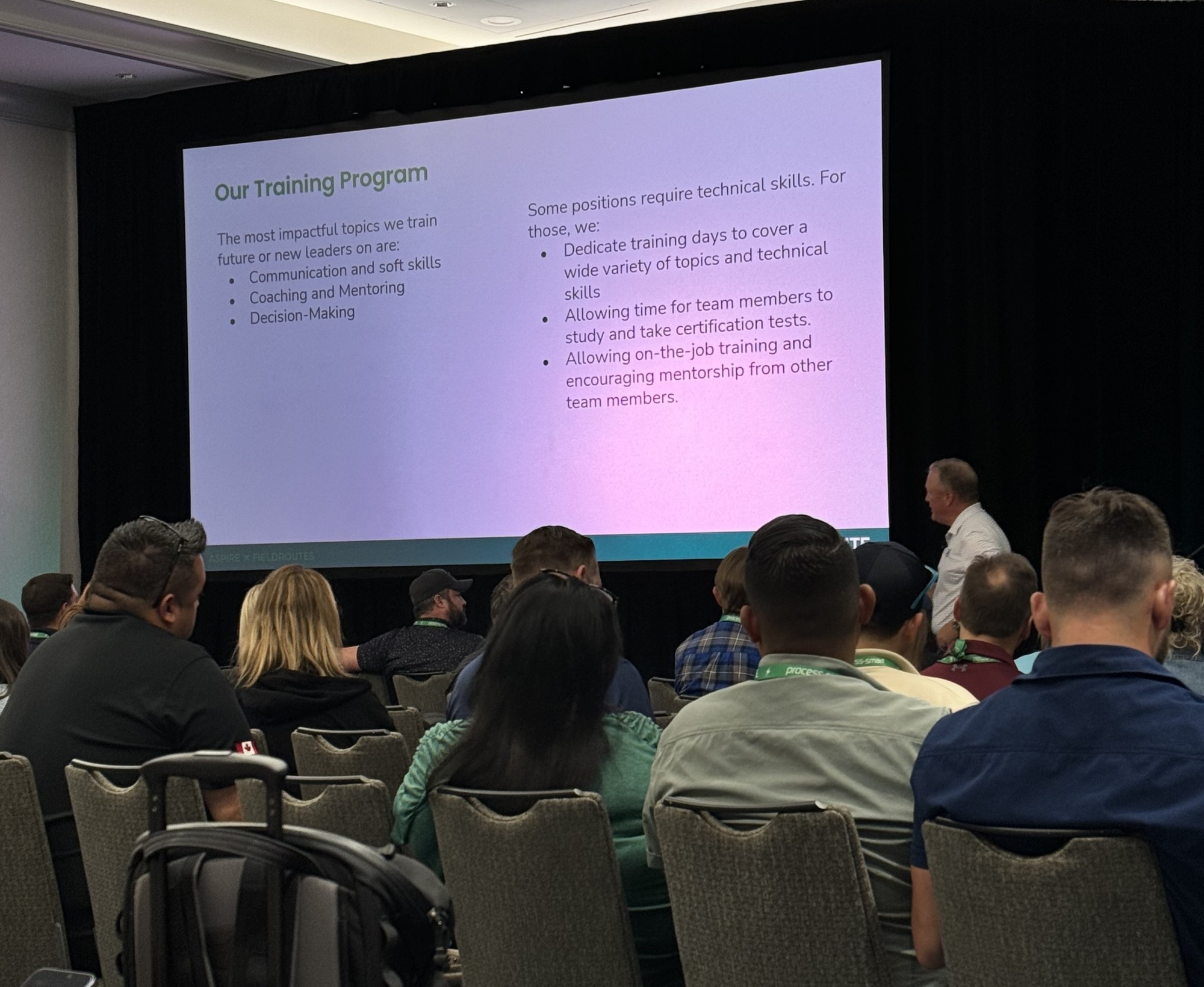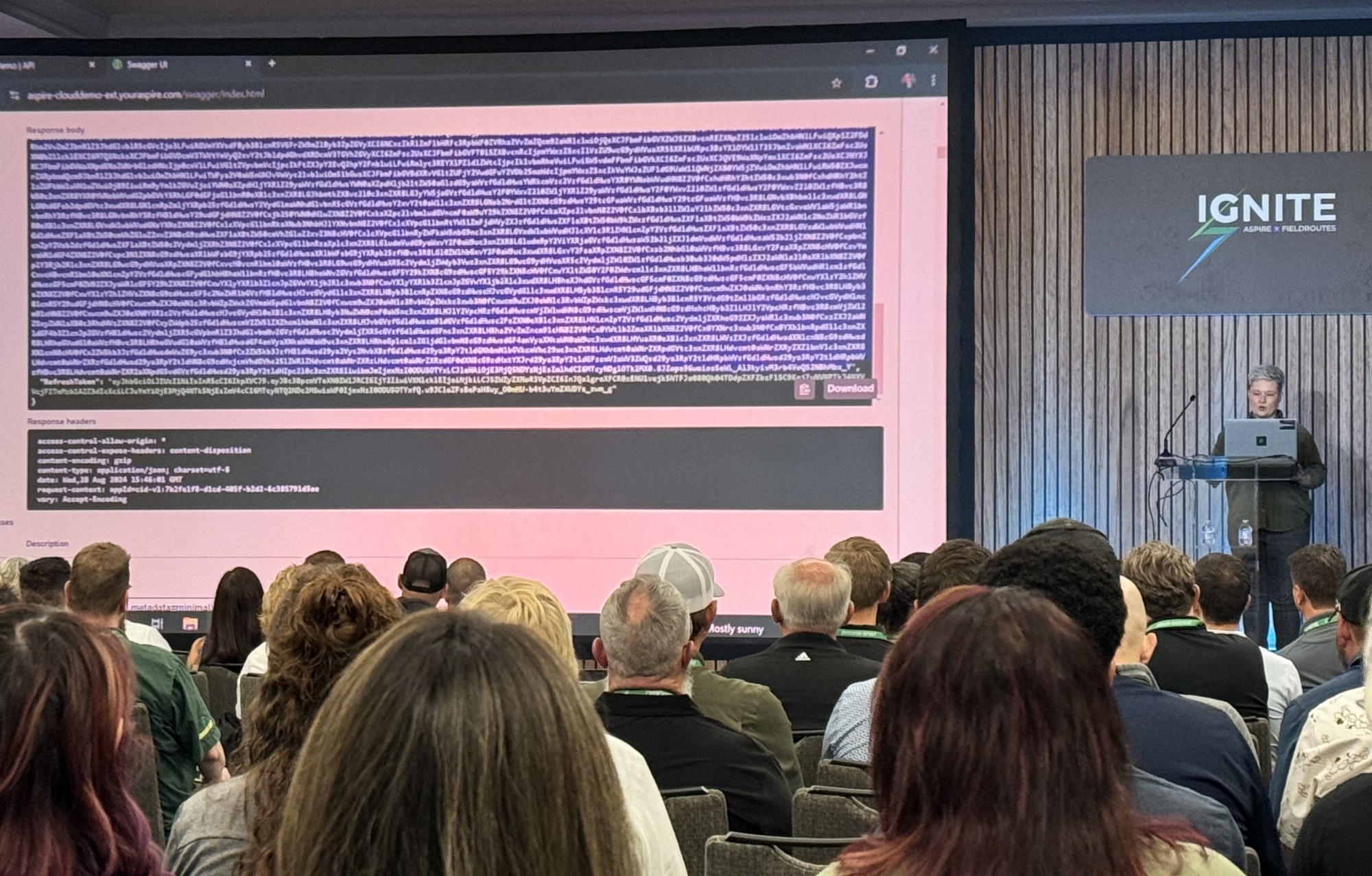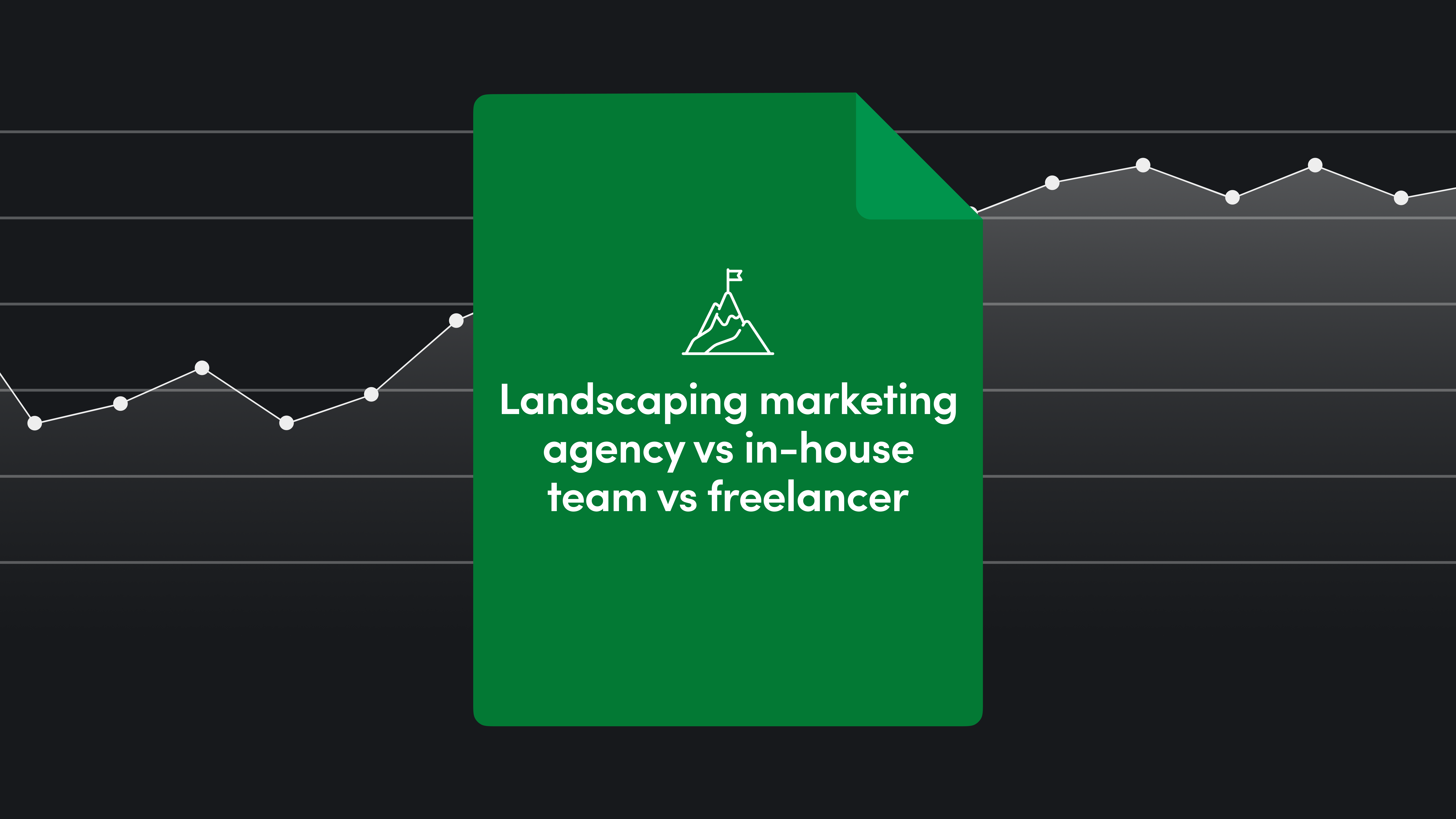Table of Contents
Table of Contents
- Flipping the Script: Grunder's Innovative Approach to Leadership
- Unlocking Advanced Analytics: Leveraging APIs and Data Pipelines in Landscape Management
- Leadership Lessons from the Frontline: Kat Cole's Journey from Hooters to AG1
- Legislation and Regulation Impacting the Landscape Industry — What’s Coming in 2025
- Building for Success: Unlocking Efficiency and Profitability with Aspire's Expanded Construction Toolkit
- Building Your Tech-Savvy Landscape Team
This is your guide to all the highlights from Ignite 2024, including breakout session summaries, insights from industry leaders, and more.
» Read more about the awards and our finalists!
» See the Ignite 2024 Customer Award winners!
» Get all the news from Day One of Ignite
Wednesday, August 28
Flipping the Script: Grunder's Innovative Approach to Leadership

Marty Grunder, Founder and CEO of Grunder Landscaping and The Grow Group delivered an inspiring session on fostering a growth mindset within landscaping businesses.
Grunder emphasized the critical importance of having a clear vision for your company. "I don't know what could matter more to a company than your vision - your ideal state, where you're going," he stated. He shared a valuable insight from Aspire co-founder Mike Rorie:
→ "The best reason to grow a company is that you have so many great people that they are pushing you. If you don't make room for them to grow, they will leave."
This perspective underscores the importance of making your vision about your team, not just yourself. Grunder stressed, "When you make your vision about you, you will lose. You need to make it about your team. If they trust you, they will follow you and break down walls for you."
Creating a Culture of Growth
Grunder's approach to culture is intentional and focused on fostering the mindset needed to succeed. He shared his company's leadership vision, which includes:
A safe place to work (physically and emotionally)
Above fair compensation
Respect for all team members
Ample opportunity for growth and advancement
To encourage team members to embrace growth, Grunder's company focuses on showing what's in it for them. This includes:
Open book management
Role-based dials and dashboards in Aspire
Clear career paths
A bonus program
Embracing Open Book Management
One of the key strategies Grunder emphasized for fostering growth and engagement is open book management. "More data means more employee engagement," he explained. "As an employee, wouldn't you want to know more than less?"
Grunder used a compelling metaphor to illustrate the importance of transparency: "If you compare your business to a bus, the closer you are to the front with the CEO, the more you know. The further back you get, the less you know. Where would you want to sit?”
Using data to drive success
By providing employees with more information about the company's performance and goals, Grunder believes businesses can:
Increase employee engagement and investment in the company's success
Empower team members to make informed decisions
Foster a culture of trust and transparency
Encourage innovative thinking at all levels of the organization
This approach to information sharing aligns with Grunder's philosophy of putting employees first.
One of the most striking insights Grunder shared was his unconventional approach to organizational structure. "Our org chart is flipped," he revealed. "I'm at the bottom, the roots, supporting my team. They are at the top; they are the priority.”
An innovative approach to the organizational structure
The inverted pyramid model represents a profound shift in leadership philosophy. Instead of the traditional top-down approach where executives sit at the apex, Grunder places himself and other leaders at the foundation, supporting and elevating the rest of the team.
This open-book approach, combined with the data visibility provided by Aspire, creates a powerful synergy. Employees can access real-time information about the company's performance, enabling them to understand how their work contributes to the bigger picture and make data-driven decisions in their roles.
Grunder's open book management and inverted organizational structure underscore his commitment to creating a culture where every team member feels valued, informed, and empowered to contribute to the company's growth.
Cultivating Soft Skills: The Key to a Thriving Team
Grunder emphasized the importance of developing employees' soft skills, recognizing that technical proficiency alone isn't enough to create a high-performing team. He shared several key focus areas for soft skill development:
Communication Finesse: "It's not what you say, but how you say it," Grunder noted. Teaching employees to communicate effectively can significantly improve team dynamics and client relationships.
Balanced Feedback: Grunder advised, "Give good compliments, and criticism will be better received." This approach creates a positive feedback culture where constructive criticism is more readily accepted.
The H.O.T. Principle: Be Honest, Open, and Transparent. This principle aligns with Grunder's open-book management style and fosters trust within the organization.
Awareness: Encouraging employees to be mindful of their surroundings, colleagues' needs, and the broader business context can lead to more proactive and effective work.
Genuine Interest in Others: "Take an interest in others," Grunder advised. This simple yet powerful approach can improve teamwork, customer service, and overall workplace satisfaction.
Control vs. Controls: Empowering Through Trust
One of the most insightful points Grunder made during his presentation was the distinction between control and controls, particularly in the context of using Aspire software.
"I don't need to micromanage my team," Grunder explained. "I can see what they are doing in Aspire." This statement encapsulates a crucial leadership philosophy that balances oversight with trust and empowerment.
Grunder emphasized the importance of avoiding micromanagement, stating, "I don't want to be a control freak, and no one wants to work for a control freak."
The key takeaways from this perspective are:
Technology as a Tool: Aspire provides visibility into operations, but Grunder uses this capability to inform rather than dictate.
Trust-Based Leadership: Grunder fosters a culture of trust and responsibility by resisting the urge to micromanage.
Empowered Employees: When team members know they're trusted to do their jobs without constant oversight, they often rise to the occasion.
Balanced Oversight: Aspire allows for necessary controls and monitoring without veering into excessive control.
Grunder's insights remind us that true success in landscaping - and indeed in any industry - comes from a harmonious blend of innovative technology, thoughtful leadership, and a culture of trust and empowerment.
Wednesday, August 28
Unlocking Advanced Analytics: Leveraging APIs and Data Pipelines in Landscape Management

Andrew Craft, Chief "Nerd" Officer of Site Landscape Development, delivered an insightful presentation on the power of APIs and data pipelines in landscape management.
His session, "Leveraging API & Data Pipelines for Advanced Analytics," shed light on why these tools are crucial for businesses looking to optimize their operations and decision-making processes.
Why APIs and Data Pipelines Matter
Craft began by addressing the fundamental question: Why do we need APIs and data pipelines? He outlined three key reasons:
Customization: While Aspire covers 95% of what most landscape businesses need, every company has unique processes. APIs allow businesses to tailor solutions to their specific requirements.
Advanced Reporting: The data extracted through APIs enables more sophisticated reporting, leading to better-informed decisions.
Automation: By leveraging APIs and data pipelines, businesses can automate processes, increasing efficiency and allowing teams to accomplish more in less time.
Key Definitions
To ensure everyone was on the same page, Craft provided definitions for some essential terms:
Data Warehouse: A centralized repository that stores and manages data from various sources.
ETL (Extract, Transform, Load): The process of collecting data from multiple sources, converting it into a usable format, and loading it into a data warehouse.
SQL (Structured Query Language): A standard language for managing and manipulating relational databases.
Overcoming Challenges
Craft acknowledged that implementing APIs and data pipelines isn't without its challenges. He highlighted two primary obstacles:
Data Acquisition: Obtaining the necessary data can be complex, especially when dealing with multiple sources or legacy systems.
Understanding Table Relationships: Grasping how different data tables relate to each other is crucial for effective data analysis but can be challenging for those new to database management.
The Power of Advanced Analytics
Throughout the session, Craft emphasized how leveraging APIs and data pipelines can transform a landscape business. By harnessing these tools, companies can:
Gain deeper insights into their operations
Make data-driven decisions with greater confidence
Automate repetitive tasks, freeing up time for strategic initiatives
Customize their software solutions to fit their unique business needs
As the landscape management industry evolves, effectively harnessing data is increasingly crucial. Caft's session gave attendees valuable insights into how APIs and data pipelines can be leveraged to drive business growth and efficiency.
By understanding and implementing these tools, landscape management companies can stay ahead of the curve, making more informed decisions and optimizing their operations for success in an increasingly competitive market.
Wednesday, August 28
Leadership Lessons from the Frontline: Kat Cole's Journey from Hooters to AG1

In a captivating keynote, Kat Cole, a renowned business leader and innovator, shared her inspiring journey from humble beginnings to becoming a trailblazer in the business world. Cole's story is a testament to the power of resilience, adaptability, and staying connected to the frontlines of business.
From hardship to leadership, Cole's early life was marked by challenges. Her mother's decision to leave her alcoholic father when Cole was just nine years old set the stage for valuable life lessons in leadership and resilience. Despite financial struggles, Cole's mother demonstrated unwavering strength and positivity, teaching her daughter that acknowledging difficulties doesn't mean succumbing to them.
Her innovative approach to business and ability to drive growth caught the attention of AG1 (formerly Athletic Greens), where she now serves as CEO. Under her leadership, AG1 has experienced exponential growth, projecting over $600 million in revenue for the current fiscal year - a fourfold increase from 2021.
AG1's success attracted $115 million in funding in 2020, boosting its valuation to $1.2 billion. Cole's expertise in building global brands, scaling businesses, and leading high-performing teams has been instrumental in AG1's transformation into a major player in the supplement industry.
Following Her Instincts
Cole's career began unexpectedly at Hooters, where she started as a hostess and quickly rose through the ranks. By 19, she was traveling the world, opening new franchises. This experience taught her the value of on-the-ground knowledge and the importance of staying connected to those closest to the action in business.
Her plans to pursue law school were derailed as she found herself rising through the ranks of the restaurant industry.
"I thought I was going to get my engineering degree and go to law school, but my restaurant company was growing," Cole reflected. Her managers saw potential in her and invested in her growth, training her in various aspects of restaurant operations.
At just 19, Cole was entrusted with opening the first Hooters in Australia. "I stayed there for 40 days, and it changed my life. That manager changed my life," she said. This experience set the tone for her rapid ascent in the company, opening a new restaurant every 60 days.
The Brutal Mirror of Leadership
As Cole traveled the world, managing franchises and working with diverse teams, she encountered a pivotal moment of self-reflection. "Running restaurants, traveling worldwide, and meeting and working with new teams, there was lots of friction, but the only common denominator was me. That was a brutal mirror to look at," she admitted.
This realization led Cole to develop the MMDD log - "Made My Day Difficult" - a tool for mapping friction and fixing it fast. She encouraged leaders to adopt this practice, writing down one thing each day that made their day difficult. "For the most part, there were always common themes and things I could instantly improve," she noted.
Cole's MMDD log evolved into a powerful leadership tool, fostering a culture of open communication and continuous improvement. She emphasized three key steps:
Ask. Answer. Action.
Ask: "What made your day difficult?"
Answer: Build a culture where people feel safe to answer honestly.
Act: Do something about it.
"As a leader, check-ins are critical. It makes your team feel seen," Cole stressed. She shared her go-to questions for these check-ins:
What's the best part of the last 30 days?
What's the worst part of the last 30 days?
What's one thing I can do differently to be a better partner for you?
What are you most grateful for?
What's worried you or weighed on you the most?
What are you most proud of?
Cole emphasized that these check-ins should be reciprocal. "I ask you, and you ask me. It's a two-way street," she explained, underscoring the importance of vulnerability and mutual growth in leadership.
The Hot Shot Rule: A Powerful Self-Coaching Tool
Cole introduced the audience to her game-changing self-coaching tool: The Hot Shot Rule. "I now do it every Sunday," she shared, emphasizing the importance of consistent routines in personal and professional growth.
"We are our routines," Cole explained. "Whatever we want to be, there has to be a routine that gets you there." The Hot Shot Rule is Cole's way of maintaining a fresh perspective and driving continuous improvement, even when things are going well.
Here's how it works:
Imagine someone you admire taking over your role: "You enter my company. You get my team, my customers, my product. You get it all. I step out, and you take over."
Ask yourself: "What is the one thing you would do to make the business better?" Cole stressed that it's usually the first thing that comes to mind and often something you already know but haven't acted on.
Act quickly: "I put it in motion in the next 24 hours," Cole said, underlining the importance of swift action.
Share it with your team: "We have a huddle every Monday. I have done this for 15 years," Cole revealed. "I tell them what I should have done or could have done. And now I'm doing it.”
Interestingly, Cole noted that her team's responses to her Hot Shot Rule revelations are often along the lines of, "What took you so long?” or “It's about time.” This feedback validates the importance of the exercise and keeps leaders accountable to their teams.
Overcoming Complacency for Continual Improvement
Cole highlighted how this exercise helps combat complacency: "We are blinded by our own progress. It is not natural to think about things you could do better when you're crushing it. Why rock the boat?”
However, Cole stressed the importance of constant improvement: "We need to constantly improve and be better for ourselves and others. It's our responsibility."
By regularly practicing the Hot Shot Rule, leaders can maintain the perspective of an outsider with fresh eyes, identifying areas for improvement that might otherwise be overlooked.
To maintain this commitment to growth and improvement, Cole regularly asks herself two critical questions:
Is my work done here?
Would someone else do it better than me?
"If the answer is yes, then move on," she advised. "If the answer is no, then I have an obligation to do better."
This approach ensures that leaders remain accountable and continuously strive for excellence, even when things are going well.
Cole highlighted how stepping out of routine and gaining outside perspectives can reinvigorate leadership:
It wakes you up and gets you out of your routine.
It brings back that "fresh day one energy."
It helps identify blind spots and areas for improvement that may be overlooked in day-to-day operations.
By regularly seeking fresh perspectives and challenging oneself with the Hot Shot Rule, leaders can avoid stagnation and continue to drive their organizations forward.
“Now my team members come to me,” she said.
Staying Close to the Action: Lessons from Cinnabon
When Cole joined Cinnabon, she knew she needed to get close to the action to identify areas for improvement. She emphasized that true insights often come from those on the front lines, interacting directly with customers and products.
"Merely talking to your teams can reveal invaluable insights," Cole explained. She offered a simple yet effective strategy: "Ask your customer service reps, what are we constantly saying no to? That action showcases a customer's desire. That desire is an insight that you need to listen to."
She started by asking her team two critical questions:
"What are customers asking that we are constantly saying no to?" The surprising answer: Smaller portions.
"What do I make you use that you don't use? What do you see people throw away?" To her surprise, the answer wasn't spoons or napkins but a portion of the cinnamon roll itself.
These simple questions revealed two significant insights:
There was a demand for smaller portion sizes that wasn't being met.
The current portion sizes were leading to product waste, indicating a potential for cost savings and improved customer satisfaction.
"Just talk to the team," Cole advised. "By talking to your team, you get close to the action and can identify opportunities to change the business."
Turning Insights into Action
As Cole wrapped up her motivational keynote, she left the audience with a powerful tool for gaining insights and staying close to the action. She encouraged leaders to regularly ask their teams three critical questions:
"What's one thing we should stop doing?"
"What's one thing should we start doing?"
"What's one thing you would start doing if you were me?"
"This is how you get insights," Cole emphasized. "Staying close to the action."
These questions serve multiple purposes:
They empower team members to voice their observations and ideas.
They help identify inefficiencies and opportunities for improvement.
They provide leaders with fresh perspectives on their roles and responsibilities.
A Continuous Journey of Improvement
Cole's final message underscored the importance of continuous improvement, even in times of success. "Even if you're crushing it, you can always find someone doing more with less. That's the next benchmark," she advised.
Kat Cole's journey from a Hooters waitress to a leader in the e-commerce nutrition industry is a powerful reminder of the importance of adaptability, resilience, and staying connected to the heart of your business. Her story inspires leaders to value frontline insights, invest in their teams, and never stop learning and evolving.
As attendees left the keynote, they carried with them Cole's words and a renewed sense of what it means to be a true leader in today's fast-paced, ever-changing business landscape.
Legislation and Regulation Impacting the Landscape Industry — What’s Coming in 2025
Policies are being enacted every day throughout the U.S. that will impact your ability to operate your landscape business. The National Association of Landscape Professionals (NALP) advocates tirelessly on behalf of the industry. In this Ignite breakout session, Andrew Bray, Vice President of Government Relations for the NALP, shared the most up-to-date information on hot-button issues like H-2B, pesticides, water, and the push to transition from gas to electric landscape equipment.
“With advocacy, there are so many things we could be out there doing for you,” Bray said. “We know there are a lot of threats, there’s lots of opportunities, so every year we work through our government affairs council and we come up with what we call our tier 1 priorities.”
The H-2B nonimmigrant program permits employers to temporarily hire nonimmigrants to perform nonagricultural labor or services in the United States and many landscape companies rely on this source of labor during the peak season. Bray explained the efforts the NALP is making to get key language changed in the legislation to permanently protect this labor source. The current push is all about changing one word — may — and making that “may” a “shall.”
Right now the language surrounding H-2B says the president “may authorize” these foreign workers but the NALP is lobbying for the language to say the president “shall authorize.”
Bray said, “The may to shall would make it so we don’t have to lobby whoever is in the White House to get these extra visas. It just would automatically happen. The rule’s been written. It benefits us all.”
That’s just one effort the NALP is making to help landscape professionals navigate labor issues.
Another big topic facing everyone in the industry is legislation regarding pesticides. This falls under the Farm Bill.
“Pesticides are like a four-letter word in DC,” Bray said. “You just don’t get people who want to lobby for a pesticide issue. That’s the reality of it, but pesticides are important to our business when used responsibly. Obviously it’s a core component to many of your businesses and it’s extremely important in the lawn care industry.”
Bray explained that most states regulate pesticide certification, licensing, reporting, etc., but there are a few states that allow localities to regulate pesticides. For example, in Montgomery County, Md., you are not allowed to use pesticides. Bray said there’s been this growing trend of trying to roll back statewide regulations in favor of local authority. “So what we are doing in the Farm Bill is we have language in there that says only the state can regulate pesticides,” Bray said. “This would be a game changer for anyone who’s relying on pesticides.”
The transition from gas to electric was the next hot button topic that Bray addressed. “We support responsible transition,” Bray said. “We’re not going to hold onto that gas-powered equipment until it’s pried from our hands. We’re stewards of the environment, but it needs to be a responsible transition and that transition needs time and it needs funding and resources.”
Specifically, the NALP wants this to remain a federal issue so states and localities can’t mandate these transitions too quickly for landscape business owners to be able to afford the capital required to switch over to these new electric tools. He said several states and local governments have already tried to push through restrictions and litigation is ongoing to stop this trend.
Finally, Bray addressed the issue of water and water restriction: “This is the one that I want to bring everybody’s attention to, because I think this is where the most pressing existential threat to our industry is right now and where we need to adapt and fight the notion that we need to remove all turf — especially in the areas where water conditions are not ideal.”
Bray says the attack on turf includes people defining turf as non-functional. “As an industry we don’t believe that turf is ever non-functional,” Bray said. “It’s always serving some recreational, environmental or community purpose.”
Bray said that NALP is working hard with its partners at state associations to change the narrative. He said they will be pushing some public relations out in the next six months about the benefits of your turf and why smart, responsible irrigation is completely doable and feasible. He said this is where he sees NALP’s fight coming for the next couple of years, and he encouraged business owners to stay informed so they can be engaged and active with their federal, state, and local elected officials.
Building for Success: Unlocking Efficiency and Profitability with Aspire's Expanded Construction Toolkit
Aspire has expanded Construction functionality that will empower your business to streamline construction operations, improve financial performance, and achieve greater project success. At this Ignite breakout session, a team from Aspire dove into details on how recently released and upcoming new features will transform the way you manage projects to drive success.
Aspire’s Gage Roberts said they are excited to be delivering on construction functionality because so many customers have diversified from commercial into construction and others are now solely focused on the construction sector.
He and the team started the session by reviewing some of the new features rolled out already in 2024, beginning with Improved WIP Reporting that allows for ongoing job performance data rather than the six-month limit on data that existed before.
“Larger scale construction is typically six months or greater, that was a challenge,” said Cris Poggi, Director of Solution Engineering and Partnerships with Aspire. “You needed to be able to review WIP in a greater way and so we improved that WIP reporting, knowing that these larger scale opportunities in construction projects need to have that insight. So this will hopefully be a really good tool for those of you that have those very large, long projects.”
“I’ve been at Aspire for a very long time and seen the progression of the product,” Roberts said. “(This) is taking us from just being able to handle a large enhancement job to really being able to handle a construction project.”
Another feature that attendees were particularly interested in is Item Catalog Price Overrides. The new functionality will allow users to program those into the catalog rather than changing them manually on individual invoices.
Project Management Updates are on the horizon as well. “It was a significant challenge, managing your projects with our existing GANTT. While it was helpful and provided insight, it was more of a basic 1.0 GANTT,” Poggi said. “Now we have the capability to really assist you to help you manage those complex construction projects and make sure that you have a tool that your team can use to capture those key milestones and details. This is a really robust addition.”
Roberts also addressed the issue of Change Orders Post-completion. The old model did not allow users to make any changes once a project had been marked as complete and the invoice went out. “This is not a challenge in the maintenance world,” Roberts said. “It’s a very large challenge in the construction world. (Now) you will be able to go back and do change orders, both positive and negative, even if it’s been invoiced out.”
There are more new features to explore in Aspire for Construction including Vendor Management, Equipment Scheduling, Revenue Forecasting and more. The team at Aspire encouraged everyone who hasn’t started to use these new functionalities to get started now.
Building Your Tech-Savvy Landscape Team
With such competition for attracting tech-savvy talent, what does it take to set your company apart from the pack?
It requires a plan, most of all. That was the key that Tito Caceres, from Bloom Talent Solutions, stressed repeatedly during a session at Ignite 2024.
“The best companies have a path for growth for employees,” Caceres said. “The ones that don’t are going to have a tougher path forward.”
With landscaping expected to grow 10% and pest control expected to grow 8% annually, what are high-level candidates really weighing, rather than just competitive wages?
Caceres said candidates are concerned with:
» What’s in it for me? What’s the allure of the new company?
» Culture. Who am I working for? Who am I working with? This is where the quality of the interview process comes into play. If it’s a “rough” interview process for a candidate, and they get a bad feel from the process, no amount of salary will likely make up for that!
“Ask any executive in the top 10 companies on how they attract young professionals, and here’s what they’ll say,” Caceres said. “They can lay out for them — here’s your path to grow, and if you do these things, you will progress in your career. They have to know how to get there.”
Eddie Wooten, Scott Goldman, Missy England, and Deborah Goldman contributed to this blog coverage.




![Pricing commercial snow removal services & contracts [Guide] Pricing commercial snow removal services & contracts [Guide]](http://images.ctfassets.net/3cnw7q4l5405/3acYBdegrhUBOhNOS9iGR7/6626ed8cb1a74c987e29392a001c47d9/Pricing-Commercial-Snow-Removal-Blog_Featured-Image.jpg)







